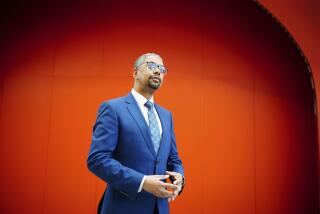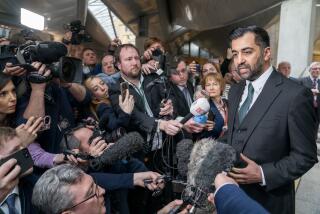Britain Faulted for Ethnic Divide
- Share via
LONDON — Britain’s cities are “deeply fractured” along racial lines and there is little cross-cultural understanding between the nation’s white majority and ethnic minorities, the government said Tuesday.
Six months after the country’s worst race riots in more than 15 years, four government-commissioned reports concluded that races maintain “parallel lives,” with separate schools, jobs, community groups and places of worship and have no shared sense of British identity.
The reports said ethnic segregation and a “lack of honest and robust debate” about race issues were factors that contributed to clashes in May between police and hundreds of Pakistani, Bangladeshi and other Asian youths in the northern town of Oldham and similar disturbances in Burnley, Leeds and Bradford weeks later.
Rather than providing leadership, politicians have “tiptoed” around sensitive race issues and created a window of opportunity for far-right groups to exploit fears among whites, the reports said. Minorities have been left to nurse their frustrations.
Ethnic minorities make up about 5% of Britain’s population of nearly 60 million. Indians, Pakistanis and Bangladeshis make up the largest immigrant bloc.
The riots were the worst since West Indian blacks rose up in the mid-1980s, and the degree of anger and frustration caught many Britons by surprise. Scores of people, including police, were hurt by bricks, glass and firebombs that caused tens of millions of dollars in damage.
While the reports called on local governments and police forces to address issues of housing supply and high crime, the thrust of the government’s proposals was for more dialogue to “break down the artificial walls” separating ethnic groups and for a clear definition of citizenship in a multicultural Britain.
One of the more controversial recommendations was for immigrants to swear a new oath of allegiance to demonstrate their “clear primary loyalty” to Britain.
Such an oath would include a clause pledging that “use of the English language . . . will become more rigorously pursued,” said Ted Cantle, chairman of the team that produced one of the reports, which were commissioned by the Home Office.
But Oldham’s deputy mayor, Riaz Ahmad, dismissed the idea of an oath as irrelevant and said the reports failed to propose concrete solutions to problems that led to the riots.
“You could stick the Union Jack on every collar, but it won’t help,” Ahmad said in a telephone interview. “The real enemy is poverty and deprivation, but those two issues don’t seem to be addressed. Otherwise, it’s all just lip service.”
Cantle’s report also said that single-faith schools, which the government supports, pose a “significant problem” in racially divided communities by reinforcing segregation. It suggested that such schools reserve at least a quarter of their places for children of other religions, to help improve relations between white and minority groups.
Home Secretary David Blunkett kicked off a heated debate on national identity over the weekend by saying that immigrants should be able to speak the English language and uphold the cultural norms of the country. By way of example, he said Muslims should reject the “unacceptable” and “intolerable” practices of forced marriages and female genital excision, which are illegal in Britain.
Critics responded that Blunkett was advocating forced assimilation and reinforcing negative stereotypes--most Muslims in Britain do not engage in these practices, they noted--without proposing any positive steps for multicultural understanding.
“He’s started off the dialogue by sounding like he is trying to demonize Asians, which is what we felt in May when people took the anger of a few people and generalized it to the whole Asian community,” Ahmad said.
Members of Blunkett’s Labor Party recoiled at the use of concepts such as “British cultural norms” that are frequently espoused by the far right. The wording was mocked by liberal newspapers that wondered whether he meant immigrants must learn to accept late trains, drink too much at the local pub and support failed British cricket teams.
Blunkett and his lieutenants emphasized that improved race relations are “a two-way street” that requires “sensitivity, not political correctness.”
Cantle, chairman of the Community Cohesion Review Team, tried to distance himself from the home secretary’s comments, saying whites share the responsibility for improving race relations.
“It isn’t about ethnic minorities changing. It’s about the white community changing too,” he said. “It is about the white community taking responsibility for stamping out racism, for learning about other communities and to value the diversity of living in a multicultural society.”
Cantle said the government has unintentionally fueled ethnic resentment by forcing poor white and ethnic communities to compete against one another for urban renewal funds. Perceptions of preferential treatment for some ethnic communities have caused friction, he said, although investigators found no evidence that minorities have been given more aid than whites.
More to Read
Sign up for Essential California
The most important California stories and recommendations in your inbox every morning.
You may occasionally receive promotional content from the Los Angeles Times.













